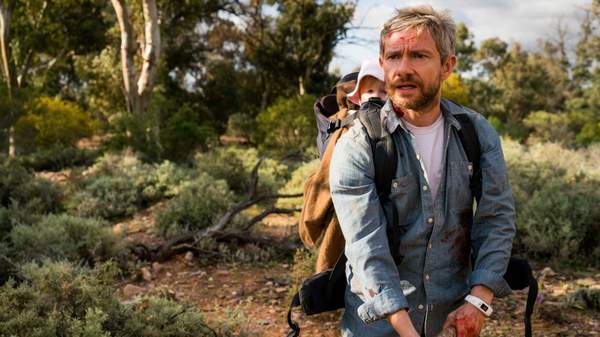Overview
UPDATE, November 26, 2020: Cargo is available to stream via Netflix and Academy OnDemand.
The ravenous undead have been chomping their way across screens for decades. Still, if it seems like their appetite has kicked into higher gear in recent years, that's because it has. Or, perhaps more accurately, the viewing public's hunger for zombie fare has ramped up considerably. Undead thrillers, zombie comedies, long-running TV shows about the brain-eating hordes — we just can't get enough. It's a zombie feast, not a zombie famine, although don't go thinking that you've seen it all before. Australian film Cargo sinks its teeth into the undead basics, and yet still manages to carve out its own territory rather than mindlessly following the masses.
With people scarce and zombies shuffling, the movie begins in a standard-enough fashion, plunging into an outbreak that transforms the living into the living dead in 48 hours. Andy (Martin Freeman) and Kay's (Susie Porter) solution is to stick to their houseboat and float down an outback river, which is the best thing they can do to keep their infant Rosie safe. Unfortunately, their sense of security is short-lived, leaving Andy scrambling across the dusty landscape to protect his baby. Also trying to cope with the new dystopian status quo is young Indigenous girl Thoomi (Simone Landers), with Cargo examining more than one fraught father-daughter relationship.
Updating their 2013 Tropfest short of the same name to feature length, co-directors Ben Howling and Yolanda Ramke know that less is more. A good zombie film doesn't need complicated scenarios or elaborate explanations, so the duo keep things simple. A great example of the genre puts more focus on the humans than the undead, so that's how the filmmakers approach their movie. You won't find heaving throngs of walking corpses here — but you will find a variety of folks handling the life-or-death crisis in different ways. Andy desperately searches for someone to look after Rosie. Ex-fracking worker Vic (Anthony Hayes) plans for the future in a far more insidious manner. And while Thoomi has managed to keep her zombified dad (Bruce R. Carter) around, her elders, lead by their cleverman Daku (David Gulpilil), have their own methods — and their own ideas about the source of the pandemic.
If it's rare for a zombie flick to dive so deeply and thoughtfully into its characters, then it is rarer still for such a film to also ponder various kinds of death and destruction. Writing as well as co-helming, Ramke weaves both humanity's impact upon the environment and white settlers' treatment of Australia's aboriginal people into the narrative — and Cargo is all the better for it. While there's plenty that's familiar, especially if you're an undead connoisseur, the movie smartly and astutely plays up the many real-life parallels that come with its premise. These days, contemplating the end of existence as we know it goes hand-in-hand with contemplating our ecological footprint. Similarly, exploring a world where one part of the population terrorises another provides a timely exploration of race relations. Previous zombie stories have also drawn comparable conclusions, but where George A. Romero highlighted racism in Night of the Living Dead half a century ago, Cargo reclaims a space for Indigenous culture in the fight for survival.
Amongst all of the above, and amidst the gorgeously shot South Australian backdrop, Freeman and Landers stand front and centre. The former might be a veteran and the latter a newcomer, but the movie wouldn't work quite as well without either. Freeman's recognisable everyman persona comes in handy, even if it makes you remember his trek across greener terrain in The Hobbit trilogy. Landers' naturalism couldn't be more buoyant, even in such a bleak film. One gets more screen time than the other, but together they embody Cargo's distinctive take on its well-worn genre. This involving, moving zombie drama initially ambles along a reliable path, yet isn't afraid to find its own direction — and isn't shy about blending the expected and the fresh in the process.
